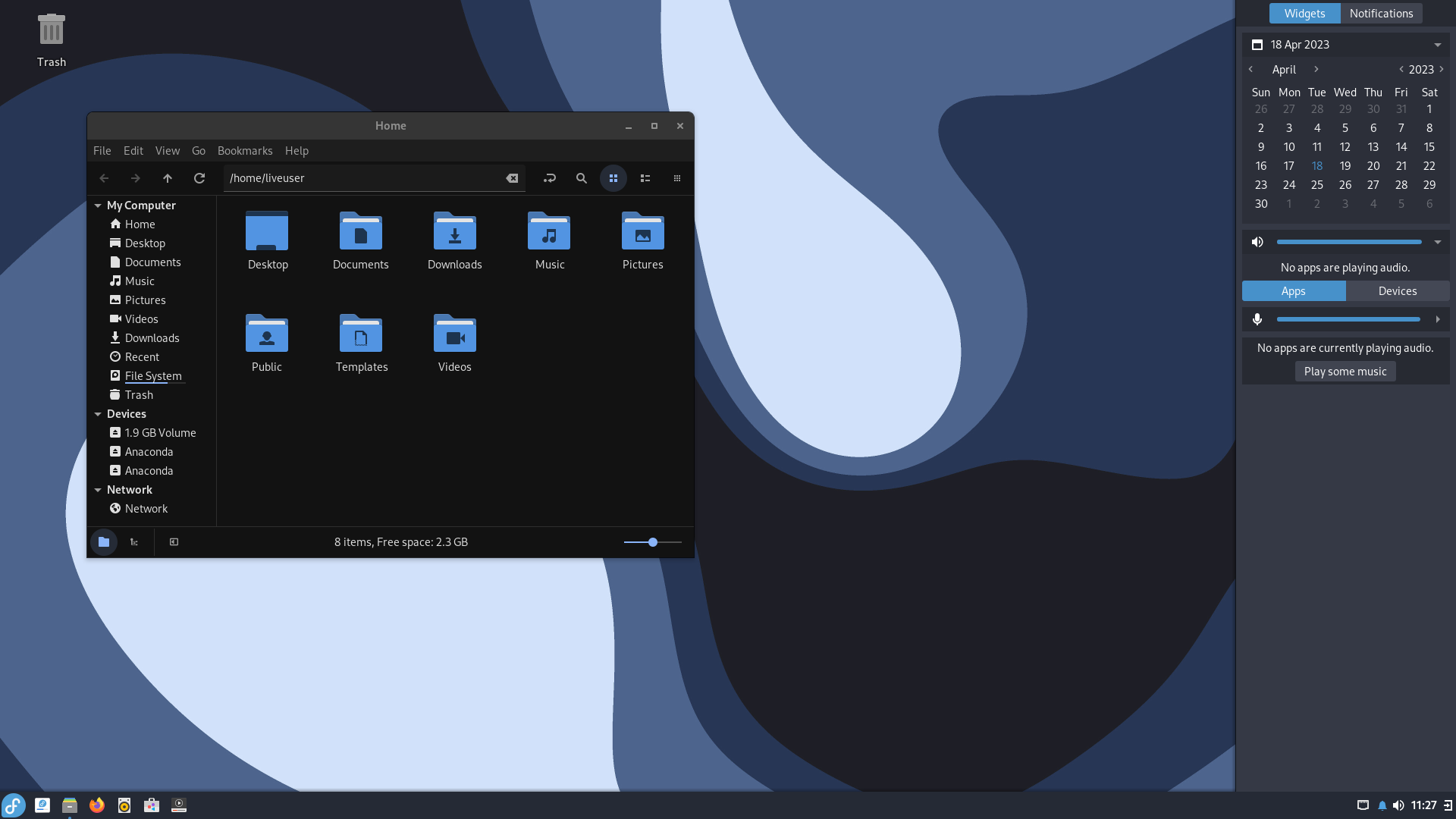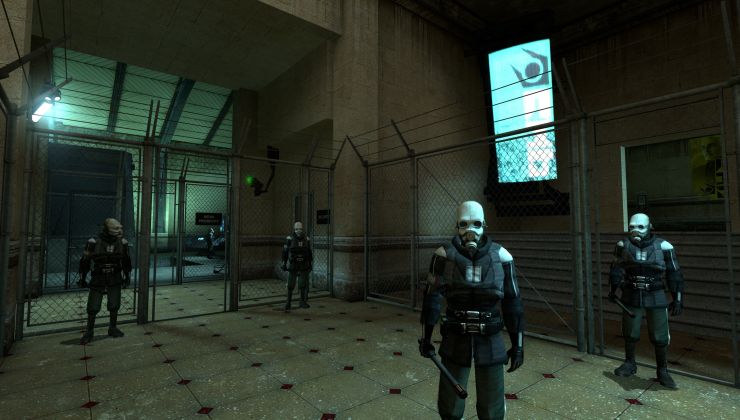Fedora has a big new release available in version 38 which came a bit early. As usual lots of new features and fixes, plus a fancy new Budgie desktop spin.
You can grab it as the main Fedora Workstation which includes an upgrade to GNOME 44 that's filled full of new features like the thumbnail view in the file picker, a new lock screen, enhanced quick settings with a "background apps" section, improvements to accessibility settings, better Flatpak support along with the new unfiltered view of applications on Flathub and so on. The Fedora team also made an adjustment to make shut downs faster.
 Pictured - Fedora Workstation 38
Pictured - Fedora Workstation 38
This release also brings with it new official spins (alternative desktop environments) like the Budgie Desktop, "Sericea" that comes with the Sway window manager in an rpm-ostree version and a Phosh image for mobile devices. This is in addition to the existing spins with KDE, Xfce and more.
Various other upgrades like the inclusion of the updated dnf5 package manager for testing that has performance improvements, a smaller memory footprint, and a new daemon that can provide an alternative to PackageKit.
See the release announcement for more. They also have a brand new website.
I love what Fedora does but once I started using other package systems 25+ years ago it's really hard to give up the massive package repositories provided by deb and arch based distributions. Finally, they've tried for years to improve the speed of their package managers but they are terrible every time I give them a try.
In the era of Flatpaks, I find myself using system packages much less often for user-facing applications nowadays. For CLI developer tools, traditional packages are still the way to go, but it's rare for me not to find them in the Fedora repositories. If I find a CLI tool that isn't packaged, it's usually not packaged in any Linux distribution outside of Arch's AUR.
Last edited by Calinou on 18 Apr 2023 at 5:32 pm UTC
I love what Fedora does but once I started using other package systems 25+ years ago it's really hard to give up the massive package repositories provided by deb and arch based distributions. Finally, they've tried for years to improve the speed of their package managers but they are terrible every time I give them a try.
A rewrite of dnf (dnf5 -> https://dnf5.readthedocs.io/en/latest/about.html) is supposed to become default on Fedora 39. It can be installed on F38 too; though I believe it conflicts in undocumented ways with the stock dnf.
Allegedly it's faster, with less complicated cli options, etc.
In the era of Flatpaks, I find myself using system packages much less often for user-facing applications nowadays. For CLI developer tools, traditional packages are still the way to go, but it's rare for me not to find them in the Fedora repositories. If I find a CLI tool that isn't packaged, it's usually not packaged in any Linux distribution outside of Arch's AUR.Same. I basically go for Flathub first before anywhere else when looking for apps now.
In the era of Flatpaks, I find myself using system packages much less often for user-facing applications nowadays. For CLI developer tools, traditional packages are still the way to go, but it's rare for me not to find them in the Fedora repositories. If I find a CLI tool that isn't packaged, it's usually not packaged in any Linux distribution outside of Arch's AUR.Same. I basically go for Flathub first before anywhere else when looking for apps now.
So what i gather, this basically means that one doesn't have to enable RPMFusion (free nor non-free) anymore via terminal commands after installing Fedora
Also Fedora is my current daily driver. Just upgraded from 37 to 38 today, and I barely notice a difference other than the version number. To me that's a win.
The continued stability of Fedora just gave me that bit of needed confidence to delve into the wild world of tiling window managers, and while my setup is still very frogging atrocious, I am very happy with it, and can't wait for it to improve, config line by config line.
I immediately switched from Nobara (which is Fedora based anyway) to Fedora 38 Sway and it is just so frogging great.Why did you switch from Nobara to Fedora?
I love what Fedora does but once I started using other package systems 25+ years ago it's really hard to give up the massive package repositories provided by deb and arch based distributions. Finally, they've tried for years to improve the speed of their package managers but they are terrible every time I give them a try.Same. My first Linux experience was Red Hat then Fedora once the first version of that released. Didn't realize how slow rpm packages were until I switched to Debian and Arch based distros. Maybe I'll give it another go now that Flatpaks are so common and don't have to rely on rpms so much.
This has changed a great deal when Fedora switched to DNF. I've used both Arch and Debian for several years and I could barely tell the difference.I love what Fedora does but once I started using other package systems 25+ years ago it's really hard to give up the massive package repositories provided by deb and arch based distributions. Finally, they've tried for years to improve the speed of their package managers but they are terrible every time I give them a try.Same. My first Linux experience was Red Hat then Fedora once the first version of that released. Didn't realize how slow rpm packages were until I switched to Debian and Arch based distros. Maybe I'll give it another go now that Flatpaks are so common and don't have to rely on rpms so much.
I gave Nobara a genuine try, too, and while I like the ideas behind it, three things were dealbreakers:I immediately switched from Nobara (which is Fedora based anyway) to Fedora 38 Sway and it is just so frogging great.Why did you switch from Nobara to Fedora?
1. Certain GNOME extensions could not be uninstalled without breaking the system, and these extensions caused serious performance regressions.
2. The bus factor is too low for my comfort. Which also leads to proper distro support being almost non-existent versus Fedora.
3. There wasn't a real compelling reason to stay on Nobara versus vanilla Fedora Workstation after getting past the "this is neat" factor.
Last edited by sprocket on 19 Apr 2023 at 9:00 pm UTC
I love what Fedora does but once I started using other package systems 25+ years ago it's really hard to give up the massive package repositories provided by deb and arch based distributions. Finally, they've tried for years to improve the speed of their package managers but they are terrible every time I give them a try.
dnf5 is actually really nice, I would even compare it to eopkg. And I never could follow the argument of too few packages, I never did miss any in any major distro (but Solus).
I personall find the debian based distros tremendously slow when it comes to package management.
Arch.. well, sweet spot there, pacman is probably the best one out there. I stopped using arch based distros due to their bad optional depend choices (if the software needs it for featurs it should not be optional, even if it is an option on compile, but there the paradigm of Arch and I have diffferent opinions).
What I can agree on, current dnf is painfully slow.
Last edited by STiAT on 21 Apr 2023 at 11:38 pm UTC
Arch.. well, sweet spot there, pacman is probably the best one out there. I stopped using arch based distros due to their bad optional depend choices (if the software needs it for featurs it should not be optional, even if it is an option on compile, but there the paradigm of Arch and I have diffferent opinions).If you are into using virtual machines or live USB sticks to test distros, you should try [KaOS](https://kaosx.us/). They are not a fork of any other distro, however they use pacman for the package management tool! It has a good feel.
I've been playing with Kinoite a little bit in a VM as a way to get hands-on with Flatpak. I don't have a solid opinion yet. I will say that trying to get vim and Kate to work is not obvious. Kate doesn't work via the app menu even though it's listed, nor is it or vim in the bash profile path. Those are pretty fundamental programs that I need to use all the time. I think this OS spin is a proof of concept, but it's an interesting one that could get traction, especially on vendor or corporate supported devices.
Arch.. well, sweet spot there, pacman is probably the best one out there. I stopped using arch based distros due to their bad optional depend choices (if the software needs it for featurs it should not be optional, even if it is an option on compile, but there the paradigm of Arch and I have diffferent opinions).If you are into using virtual machines or live USB sticks to test distros, you should try [KaOS](https://kaosx.us/). They are not a fork of any other distro, however they use pacman for the package management tool! It has a good feel.
I know KaOS and Anke probably longer than most, we both have roots in Chakra. The x86_64 focus of them makes it impossible for me (still) to use it in a proper way. I understand her intention, and I do support it, but I can not use it as a daily driver, since I depend on i386 software for my daily work.













 How to set, change and reset your SteamOS / Steam Deck desktop sudo password
How to set, change and reset your SteamOS / Steam Deck desktop sudo password How to set up Decky Loader on Steam Deck / SteamOS for easy plugins
How to set up Decky Loader on Steam Deck / SteamOS for easy plugins
See more from me